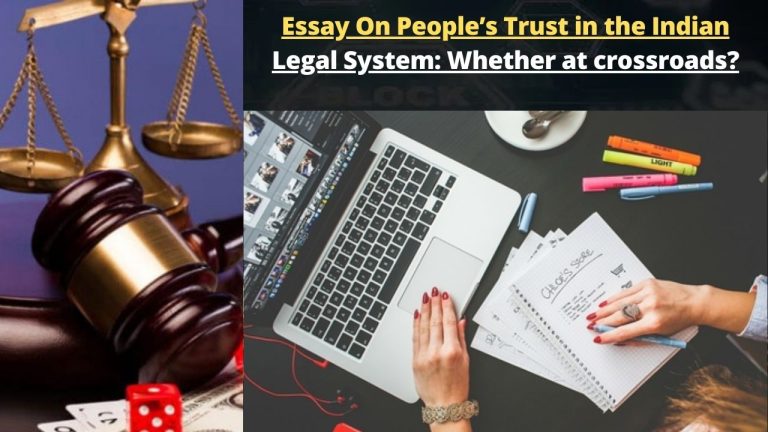"Advertisement"
Essay On People’s Trust in the Indian Legal System: Whether at Crossroads?
Introduction:
A nation’s legal system is crucial to providing justice, supporting the rule of law, and preserving social order. India is a diverse and populous nation, and its legal system is the foundation of its democratic government.
But in recent years, there have been escalating worries about public confidence in the Indian legal system.
In order to understand the current level of public confidence in the Indian judicial system, this article will examine the problems it is now facing and provide solutions.
1. Historical Perspective:
It is crucial to take into account the historical background of the Indian legal system in order to comprehend the current trust gap.
India’s legal system was based on British common law ideas and was a legacy of its colonial past.
Although the system has undergone major changes since independence, the public’s perception is still affected by the remnants of a time-consuming and bureaucratic approach.
2. Judicial Accountability and Independence:
The judiciary’s independence and accountability are two important factors that affect public trust.
The courts can serve as a check on the executive and legislative power thanks to the constitutional guarantee of an independent judiciary in India.
However, instances of judicial corruption, sluggish justice administration, and a backlog of unresolved cases have diminished public confidence in the system.
To rebuild trust, it is imperative to strengthen accountability systems, encourage openness, and hasten case resolution.
3. Access to Justice:
Access to justice is a significant aspect that affects people’s trust in the judicial system. It is difficult to guarantee equitable access to justice in a nation as big and diverse as India.
Due to reasons such as illiteracy, lack of knowledge, and financial limitations, marginalized groups in society frequently encounter difficulties navigating complicated legal systems.
This divide can be closed and trust established through boosting legal knowledge, streamlining procedures, and expanding legal aid services.
4. Judiciary Reforms:
To address the current issues, the Indian legal system needs extensive revisions.
Reducing the backlog of cases, streamlining processes, and utilizing technology for effective case management are a few of the crucial issues that require attention.
Implementing alternative conflict resolution procedures like arbitration and mediation can help lighten the load on the court system and speed up the administration of justice.
5. Public Perceptions and Confidence:
High-profile cases, media coverage, and public discourse are a few of the variables that affect how the general public views the Indian legal system.
Public trust can be greatly impacted by instances of delays, political meddling, and the perception of bias.
The legal system must actively engage the public, explain how it works, and raise awareness of how it upholds the rule of law and defends the rights of individuals.
6. Role of Legal Education:
The development of public confidence in the legal system depends critically on legal education.
Future legal professionals need to be taught about ethical principles, professionalism, and social responsibility in law schools and other educational settings.
Encouragement of experiential learning, internships, and clinical legal education can aid students in gaining a realistic comprehension of the legal system and its function in society.
7. Role of Media and Civil Society:
Public faith in the judicial system must be fostered, and civil society organizations and the media both play a significant part in this.
Public conversations on legal issues, responsible media, and balanced reporting can raise awareness and promote well-informed public opinion.
Civil society organizations can protect vulnerable groups, promote legal knowledge, and serve as a check on the judicial system to ensure accountability.
Conclusion:
The Indian legal system is at a crossroads and is struggling mightily to keep the public’s trust. To rebuild trust in the system, it is imperative to address the issues of judicial independence, access to justice, and judicial reforms.
The judicial system, legal experts, legislators, the media, civil society, and the general public must all work together to create a transparent, responsible, and effective legal system.
The Indian judicial system can only restore the confidence of its citizens and act as a beacon of justice in a varied and dynamic country by reinforcing the principles of justice and preserving the rule of law.
Finally, Thanks for Reading “Essay On People’s Trust in the Indian Legal System: Whether at Crossroads?“.
If you have any questions related to “Essay On People’s Trust in the Indian Legal System: Whether at Crossroads?“, So, please comment below.
Must Read:
Essay On Judicial backlog: Can Artificial Intelligence be the answer?
